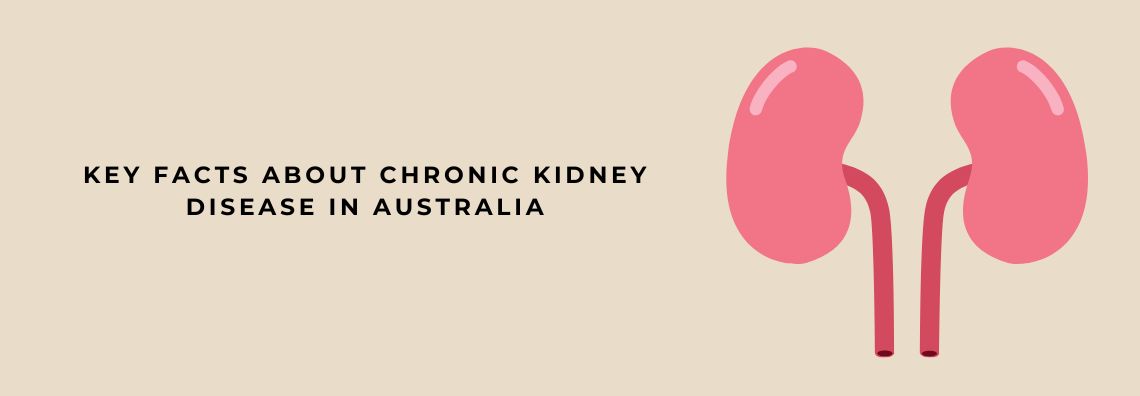
Chronic kidney disease is a notable health issue in Australia, impacting a substantial portion of the population. It’s a major public health concern, with a rising burden of CKD leading to increased morbidity and mortality. 1 in 10 Australian adults have signs of CKD.
Diabetes, high blood pressure, and cardiovascular disease, can lead to CKD. Additionally, other factors like obesity, smoking, and certain medications can increase the risk. Understand the risk factors, treatments and symptoms in this guide.
Risk Factors of CKD
Chronic Kidney Disease (CKD) risk factors include diabetes, high blood pressure, heart disease, obesity, and a family history of kidney disease. Age, smoking, and certain medications can also become risk factors. Here is a proper explanation for your better understanding:
- Dabetes, heart disease and high blood pressure can become risk factors. How? High blood sugar levels can damage the kidneys’ blood vessels and filtration units. Whereas, high blood pressure can narrow blood vessels, reducing blood flow to the kidneys. Conditions like heart failure can reduce blood flow to the kidneys.
- If you are overweight or obese, you need to take care of yourself and promote weight management through regular exercise and walking. These are some effective ways to control symptoms and manage weight.
- If you have a habit of smoking, it is not good in any way. Smoking can raise blood pressure and damage blood vessels.
- Long-term use of certain medications is also harmful and can become a risk factor for your kidneys. They can lead to kidney damage.
- Excessive alcohol consumption also contributes to kidney issues like chronic kidney disease (CKD), acute kidney injury (AKI), and damage to kidney filtering structures.
What could be the possible signs and symptoms? We know that you must be wondering. Let us help you detect these so that you can contact, “Kidney specialist near me”.
CKD: Signs and Symptoms
It is a progressive disease that can lead to kidney failure, and it often doesn’t show noticeable symptoms in the early stages. As the condition progresses, symptoms can include the following:
- Many people with early CKD experience no symptoms, and the disease may only be discovered through routine blood or urine tests. Some individuals may experience mild changes in urination frequency or a slight increase in blood pressure.
- Fatigue, swelling, changes in urination, and loss of appetite are some common noticeable symptoms. Swelling, particularly in the ankles, feet, hands, or face, can occur due to fluid retention.
- People may urinate more or less frequently than usual, or they may experience changes in urine colour or clarity.
- Nausea and vomiting, digestive symptoms, can result from the build-up of waste products in the blood.
- Skin can become dry and itchy due to the buildup of waste products.
- If fluid builds up in the lungs, shortness of breath may occur.
Report to your kidney specialist and do not forget to bring your medical history with you. Even if you had a kidney treatment or diagnosis in past or have a family history of kidney disease, you need to report it to the specialist.
Treatment Options for CKD
Lifestyle changes, medications, and in some cases, dialysis or kidney transplant are the treatments specialists can provide. Although there is no specific treatment option for CKD, these treatments can help individuals manage the condition and live long, healthy lives. How these treatments can help will be mentioned below:
Lifestyle Choices
If you start managing your lifestyle choices at the early stages, your signs and symptoms can be managed easily, and you can manage CKD. Focusing on foods low in salt, sodium, and phosphorus, while also ensuring adequate intake of potassium, is essential. Regular exercise can help manage blood pressure, improve heart health, and maintain a healthy weight.
Saying bye to excessive weight can be a good idea to deal with kidney issues. It can improve overall health and help you manage kidney diseases. Smoking can worsen CKD and cardiovascular disease, so avoid it.
Medications
Certain medications can help manage blood pressure and protect the kidneys, whereas some can help manage blood sugar levels and promote healthy glucose levels. Other medications may be used to manage specific symptoms, such as high potassium levels or mineral and bone disorders.
Dialysis
When kidneys can no longer adequately filter blood, dialysis becomes necessary. There are two main types: hemodialysis and peritoneal dialysis. In hemodialysis, a machine filters blood outside the body. Peritoneal Dialysis uses the lining of the abdomen (peritoneum) to filter blood.
As an Australian, you must get your kidney checks regularly and note down the signs and symptoms (if any) to discuss with your kidney specialist.